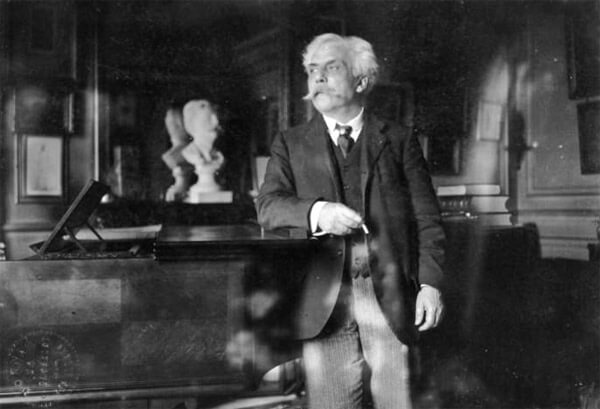Born in Pamiers, Ariège, May 12, 1845
Died in Paris, Nov 4, 1924
- Gabriel Fauré (pronunciation), while often overshadowed, undeniably transformed French music through his influence, his teaching, his leadership, and his compositions.1
- As a composer, Fauré was the most advanced composer in French music of his time and anticipated Impressionism, among many other significant stylistic trends. His musical language is deeply personal and immediately identifiable.
- The bulk of Fauré’s music consisted of piano music, songs, and chamber music (works that could be performed by his friends and colleagues in Paris salons). He is regarded by many as the greatest master of French art song.
- Growing up, Fauré anticipated training for a career as a church musician. The arrival of a new piano teacher at Fauré’s school in Paris, Camille Saint-Saëns, played a pivotal role in the teenaged Fauré’s decision to start composing. Saint-Saëns would go on to become an important mentor for the young composer.
- Fun fact – Fauré was ambidextrous. His piano compositions share a common characteristic in that both hands are of equal importance and “in many passages alternate and complement each other for the presentation of a theme or the execution of a run.”2
- Among his many professional posts was educator at the Paris Conservatoire, where he taught many burgeoning young composers such as Nadia Boulanger, Arthur Honegger, George Enescu, and Maurice Ravel.3
Learn More
Biography via Deutsche Grammophon
Sources
- Jessica Duchen, “Composer of the Month: Gabriel Fauré,” BBC Music Magazine Vol. 26, No. 13 (2018), 76-80.
- Jean-Michel Nectoux, “Fauré, Gabriel,” Grove Music Online (2001, Accessed January 17, 2024, https://www.oxfordmusiconline.com/grovemusic/view/10.1093/gmo/9781561592630.001.0001/omo-9781561592630-e-0000009366.
- Jessica Duchen, “Composer of the Month: Gabriel Fauré,” BBC Music Magazine.
Pieces
Violin Concerto in d minor, Op. 14
Après un rêve (After a Dream), Op. 7 No. 1
Ballade in F-sharp Major, Op. 19
Berceuse for Violin and Orchestra, Op. 16
Fantaisie for Flute and Orchestra, Op. 79
Masques et Bergamasques, Op. 112
Sicilienne, Op. 78 (from Pelléas et Mélisande)
Pieces
- Après un rêve (After a Dream), Op. 7 No. 1
- Ballade in F-sharp Major, Op. 19
- Berceuse for Violin and Orchestra, Op. 16
- Dolly Suite, Op. 56
- Élégie, Op. 24
- Fantaisie for Flute and Orchestra, Op. 79
- Masques et Bergamasques, Op. 112
- Pavane, Op. 50
- Requiem, Op. 48
- Sicilienne, Op. 78 (from Pelléas et Mélisande)
- Violin Concerto in d minor, Op. 14

